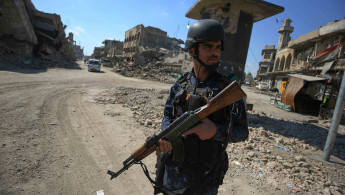IS terrorise locals through mass kidnappings, executions during Iraq resurgence
According to local sources, at least 46 people including civilians, security officers, and tribal fighters have been kidnapped in the past 72 hours, at least 20 of whom have been executed. Further attacks taking the form of ambushes on roads, IED blasts and car bombs have also been carried out in the area.
On Monday, 30 civilians were kidnapped from the Salahuddin area and taken to an unknown location. According to the head of the Salahuddin council, Ali Nawaf, the majority of those abducted were from the local Shammar tribe. Nawaf added that 7 bodies of the abductees were found on Tuesday morning, handcuffed and left in the desert.
Read more: The rapid 'liberation' of Raqqa was flawed from the outset
The Popular Mobilisation Forces (PMF), a Shia militia who have been battling IS in Iraq, also reported a discovery of bodies of civilians kidnapped by IS.
In a press statement the PMF said: "a group of IS militants kidnapped 10 civilians during an ambush on the Abu Ajareb bridge, near the desert village of Hatra south of Mosul, and took them to an unknown location," adding that they had found the bodies of seven of the abductees, who appeared to have been executed by firing squad, near the airport south of Mosul.
Twitter Post
|
Six more civilian bodies were discovered by security forces south of Mosul on Monday, also thought to have been kidnapped and executed by IS.
They said they were searching for the rest of the abductees.
Read more: Dominance of militias may haunt Baghdad
The PMF, key players in ousting IS from the majority of the territory they once controlled, have gained huge influence in these regions, reflected by a strong election result for former militants-turned-lawmakers.
Local officials in Mosul - which is soon to mark its one year anniversary of IS "liberation" - criticise the current outdated security strategy, expecting the number of ambushes to rise. They call for strategies that use intelligence gathering so they can foil ambushes before they take place.
A member of the Nineveh council Ali al-Hamdani told The New Arab: "The security chaos in the country as a whole is due to weak intelligence services and a lack of action in proportion to the threats faced by the country."
 |
Iraqi forces greatly outnumber IS fighters, but today's battles are waged over intelligence. It's a war or information more so than one fought with guns and ammunition |  |
"Iraqi forces greatly outnumber IS fighters, but today's battles are waged over intelligence. It's a war or information more so than one fought with guns and ammunition," he added.
Hamdani called for "the establishment of a new intelligence body to confront the imminent danger faced by the country."
An officer with the Salahuddin Operations Command told The New Arab: "IS has exploited the government's preoccupation with the elections and its aftermath," which is having deadly consequences in the neglected northeast desert regions.
The officer called on security chiefs to hold urgent discussions in order to formulate an appropriate security strategy for the provinces of Nineveh, Salahuddin, Kirkuk and Diyala and keep Islamic State under control.





 Follow the Middle East's top stories in English at The New Arab on Google News
Follow the Middle East's top stories in English at The New Arab on Google News
![22 Arab countries at COP29 have rejected the targeting of fossil fuels [Getty]](/sites/default/files/styles/image_330x185/public/2024-11/GettyImages-2184289638.jpg?h=199d8c1f&itok=ptHl5bec)
![Dozens of people turned out for the funerals [Getty]](/sites/default/files/styles/image_330x185/public/2024-11/GettyImages-2185229760.jpg?h=e7c891e8&itok=1bctDcE6)
![The UAE is widely suspected of arming the RSF militia [Getty]](/sites/default/files/styles/image_330x185/public/2024-11/GettyImages-472529908.jpg?h=69f2b9d0&itok=Yauw3YTG)